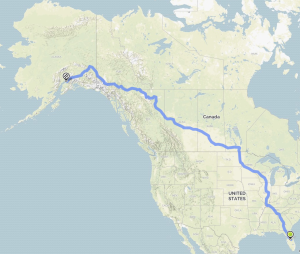Introduction
Greg Hartley
About the Editor

In 2017, my family packed our worldly possessions into a Uhaul, hitched our minivan to the back, and drove from Orlando, Florida to Anchorage, Alaska. Holding a steering wheel for fourteen hours a day during the nine-day trek resulted in a condition I like to call “noodle arm.” But while the exhaustion from that trip took days to wear off, the memories of that stressful time still give me chills. Our old lives vanished. Friends, warm climate, Mickey Mouse. All gone. In their place were strangers, glaciers, and moose.
Since then, I have finally stopped calling myself a Cheechako, although I still don’t feel like a “real” Alaskan. We feel at home here now. We love the mountains and even the snow. Glaciers are one of life’s greatest joys, and looking forward to summer berry picking keeps me going during the dark days of winter.
One certain truth we’ve learned so far is that Alaska changes those who live here. Some love it and some hate it, but regardless, you grow through the challenges The Great Land throws at you.
My love of this place powers this book. Alaska may make you or break you, but either way, you’ll have stories to tell and loads of lessons learned. (If the bears let you out alive.) In these chapters, we will explore those lessons and learn how to express in print what we’ve learned while living here.
Teaching Principles
Since this is a textbook, and I am a teacher, this introduction should include a word about my teaching style. My core educational philosophy is fairly simple and can be summed up in the following six principles:
Principle 1: Variety makes learning enjoyable. There are always new ways to learn, so we’ll play with multiple methods and approaches whenever new ideas present themselves.
Principle 2: Passion makes learning easier. When you WANT to know something, learning goes quick and easy. So chase what sparks your curiosity. On the other hand, NEVER write about any topic that bores you! Bored writing is boring writing.
Principle 3: Reading unlocks the future. Every class or job you’ll ever have will require good reading skills. The better you are at this skill, the better you’ll be at all other skills. As the saying goes, “Learn to read and you’ll read to learn.”
Principle 4: Writing changes lives. The more you write, the more influence you have. Want to change the world? Be a better writer!
Principle 5: Writing is a process. I will always separate writing tasks into steps. Just focus on one step at a time, and your essays will seem to write themselves. It’s so much better than cramming everything into one night.
Principle 6: We are a community of trust. Our classroom will always be a safe place to express yourself and receive support for that expression. That means you can expect kindness, respect, and professionalism from me. As a community, you can expect the same treatment from each other as well.
Principle 7: Place matters. We live in Alaska and we write in Alaska. So this place can and should influence your writing. Some of you came from other places, and that’s wonderful! Those places can and should influence your writing as well.
Term for a newcomer to Alaska coined during the Yukon Gold Rush. Seems to have been a mispronunciation of the word "Chicago."
The Russian word "Alyeska" stems from an Aleut word that means "mainland" or "great land."

